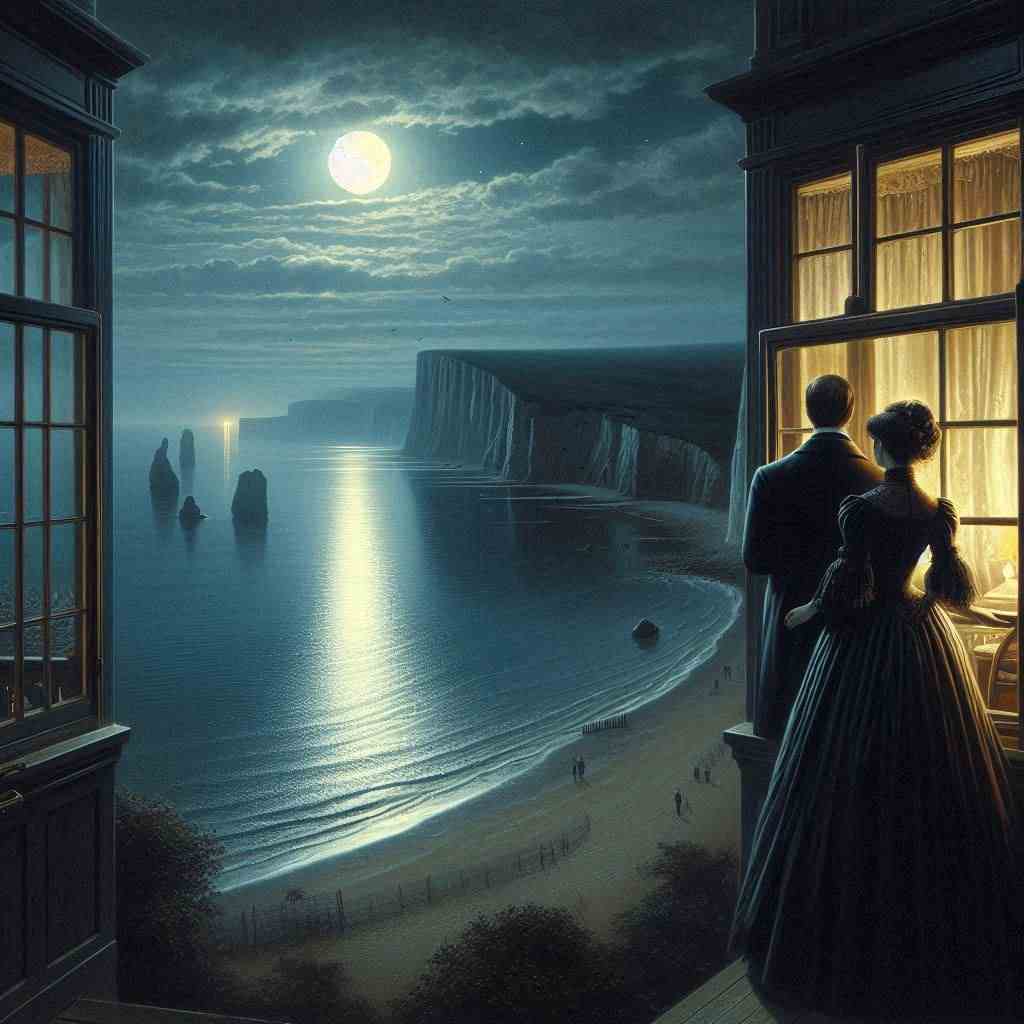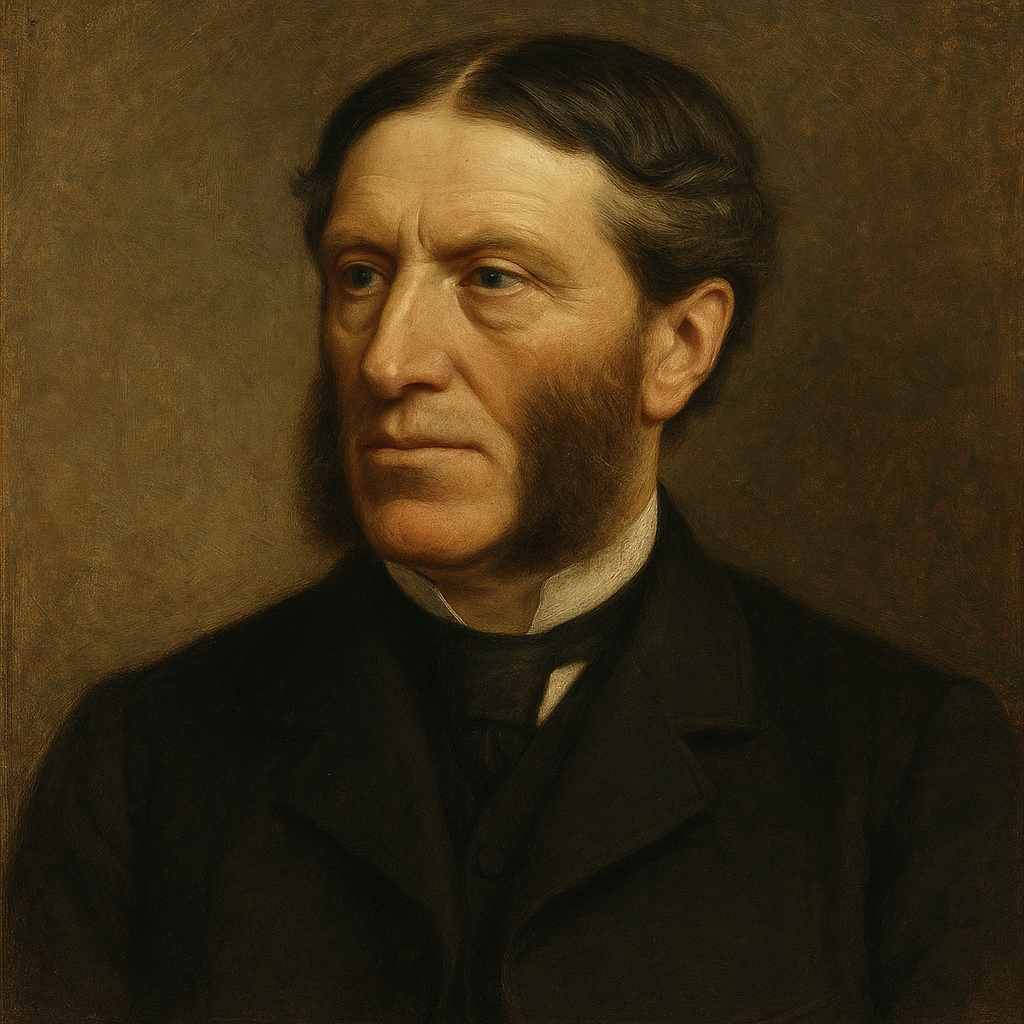Dover Beach
Matthew Arnold
1822 to 1888

The sea is calm tonight.
The tide is full, the moon lies fair
Upon the straits; on the French coast the light
Gleams and is gone; the cliffs of England stand,
Glimmering and vast, out in the tranquil bay.
Come to the window, sweet is the night-air!
Only, from the long line of spray
Where the sea meets the moon-blanched land,
Listen! you hear the grating roar
Of pebbles which the waves draw back, and fling,
At their return, up the high strand,
Begin, and cease, and then again begin,
With tremulous cadence slow, and bring
The eternal note of sadness in.
Sophocles long ago
Heard it on the Ægean, and it brought
Into his mind the turbid ebb and flow
Of human misery; we
Find also in the sound a thought,
Hearing it by this distant northern sea.
The Sea of Faith
Was once, too, at the full, and round earth’s shore
Lay like the folds of a bright girdle furled.
But now I only hear
Its melancholy, long, withdrawing roar,
Retreating, to the breath
Of the night-wind, down the vast edges drear
And naked shingles of the world.
Ah, love, let us be true
To one another! for the world, which seems
To lie before us like a land of dreams,
So various, so beautiful, so new,
Hath really neither joy, nor love, nor light,
Nor certitude, nor peace, nor help for pain;
And we are here as on a darkling plain
Swept with confused alarms of struggle and flight,
Where ignorant armies clash by night.
Matthew Arnold's Dover Beach
Introduction
Matthew Arnold's "Dover Beach" stands as a pinnacle of Victorian poetry, encapsulating the era's anxieties and philosophical quandaries within its carefully crafted verses. This poem, written in the 1850s and published in 1867, reflects the tumultuous intellectual climate of the 19th century, where rapid scientific advancements and social changes were eroding traditional beliefs and certainties. Through its vivid imagery, complex structure, and profound thematic exploration, "Dover Beach" offers a meditation on love, faith, and the human condition that continues to resonate with readers more than a century and a half after its composition.
Setting and Imagery
The poem opens with a serene coastal scene, described with such precision that one can almost hear the gentle lapping of waves and feel the cool night air. Arnold's choice of Dover as the setting is significant, as this location on the southeastern coast of England faces France across the English Channel, creating a liminal space between nations and cultures. This geographical positioning serves as a metaphor for the poem's exploration of boundaries between past and present, faith and doubt, connection and isolation.
Arnold's mastery of imagery is evident from the first stanza, where he paints a picture of tranquility: "The sea is calm tonight. / The tide is full, the moon lies fair / Upon the straits; on the French coast the light / Gleams and is gone." The use of soft consonants and long vowel sounds creates a sense of peace and stillness, which is then juxtaposed with the "grating roar" of pebbles in the following lines. This auditory shift marks the beginning of the poem's thematic transition from outward calm to inner turmoil.
Structure and Form
The poem's structure is as complex as its themes. Composed of four stanzas of varying lengths, "Dover Beach" defies easy categorization into traditional poetic forms. This structural irregularity mirrors the poem's content, reflecting the speaker's struggle to find order and meaning in a world of flux and uncertainty.
The first stanza, with its fourteen lines, resembles a sonnet, yet it lacks the conventional rhyme scheme and volta associated with that form. This deviation from expected patterns sets the tone for the entire poem, preparing the reader for a work that will challenge conventional wisdom and comfortable assumptions.
Arnold's use of enjambment throughout the poem creates a sense of continuity and flow, mirroring the ceaseless motion of the sea. This technique is particularly effective in the third stanza, where the lines "But now I only hear / Its melancholy, long, withdrawing roar, / Retreating, to the breath / Of the night-wind" create a sense of elongation and recession, echoing the imagery of the retreating "Sea of Faith."
Thematic Analysis
At its core, "Dover Beach" is a poem about loss—loss of faith, loss of certainty, and the potential loss of human connection in an increasingly chaotic world. The central metaphor of the "Sea of Faith" encapsulates this theme, with Arnold personifying faith as a retreating tide: "But now I only hear / Its melancholy, long, withdrawing roar, / Retreating, to the breath / Of the night-wind, down the vast edges drear / And naked shingles of the world."
This imagery of retreat and exposure speaks to the Victorian crisis of faith, precipitated by scientific discoveries such as Charles Darwin's theory of evolution and geological findings that contradicted biblical accounts of creation. The "naked shingles of the world" evoke a sense of vulnerability and barrenness, suggesting a world stripped of its comforting illusions and left exposed to harsh realities.
Arnold's invocation of Sophocles in the second stanza serves to universalize this experience of disillusionment: "Sophocles long ago / Heard it on the Ægean, and it brought / Into his mind the turbid ebb and flow / Of human misery." By drawing this connection across millennia, Arnold suggests that the struggle with existential doubt and the recognition of human suffering are timeless aspects of the human condition.
The Role of Love
In the face of this bleak worldview, Arnold turns to human love as a potential source of solace and meaning. The final stanza begins with a passionate appeal: "Ah, love, let us be true / To one another!" This entreaty suggests that in a world devoid of divine providence or inherent meaning, human relationships may offer the only refuge.
However, even this hope is tinged with despair. The world is described as seeming "To lie before us like a land of dreams, / So various, so beautiful, so new," but this alluring facade is quickly undercut: "Hath really neither joy, nor love, nor light, / Nor certitude, nor peace, nor help for pain." The anaphoric repetition of "nor" in these lines creates a sense of relentless negation, emphasizing the totality of the world's perceived emptiness.
Conclusion
"Dover Beach" concludes with one of the most haunting images in English poetry: "And we are here as on a darkling plain / Swept with confused alarms of struggle and flight, / Where ignorant armies clash by night." This vivid metaphor encapsulates the poem's central themes of confusion, conflict, and the search for meaning in a chaotic universe.
The use of the word "ignorant" to describe the clashing armies is particularly significant, suggesting that human conflicts—whether ideological, religious, or physical—stem from a fundamental lack of understanding. In this final image, Arnold seems to suggest that humanity's struggles, both internal and external, arise from our inability to comprehend the true nature of our existence.
In its exploration of faith, doubt, love, and the human condition, "Dover Beach" stands as a testament to Matthew Arnold's poetic genius and philosophical insight. The poem's enduring relevance lies in its unflinching examination of the challenges faced by individuals in a world where traditional sources of meaning and comfort are increasingly called into question. Through its masterful blend of imagery, form, and thematic depth, "Dover Beach" continues to speak to readers grappling with the complexities of modern existence, offering both a mirror for their anxieties and a poignant reminder of the potential for human connection in the face of cosmic indifference.
This text was generated by AI and is for reference only. Learn more
Want to join the discussion? Reopen or create a unique username to comment. No personal details required!



Comments
No comments yet. Be the first to comment!